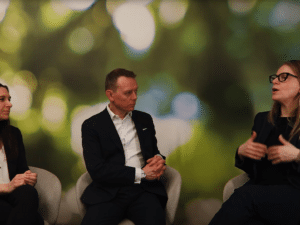Designing organisations for change: a conversation about leadership, culture and AI integration
In a world shaped by digital transformation, artificial intelligence and evolving workplace expectations, organisations are being called to rethink everything from leadership models to board structures. In a recent conversation hosted by Aseel Ibrahim, Associate Director, Commerce and Industry at Frazer Jones, People and Culture Leader Alysha Adams shared her insights on what it takes to build resilient, AI-ready organisations.
From entrepreneur to culture architect
Alysha’s journey began unconventionally. She left school at 12, taught herself her GCSEs and A-levels, and launched her first business in her teens. That early experience taught her how to hustle, learn, adapt and turn gaps into opportunities. These are competencies she still draws on today.
Now a People and Culture Leader in a fast-paced fintech environment, Alysha has spent over ten years working across commercial, charity and startup sectors. Her roles have spanned learning and development (L&D), leadership development, culture, engagement, diversity, inclusion and belonging (DIB), and workplace strategy. She also sits on two boards and recently completed a documentary on rewilding in the UK.
“I’m really interested in looking at systems, whether ecological or organisational, and how they regenerate and adapt to change,” she said. “That’s something I’m always thinking about, underpinned by a fascination with people and organisational success.”
Designing for resilience, not just performance
The conversation turned to how organisations can prepare for change, especially in the context of AI adoption. Alysha emphasised the need to move away from rigid role-based structures and instead focus on skills, adaptability and continuous learning.
“We need to think less about tasks and jobs, and more about the skill sets we need for the future, and how AI augmentation fits into that picture,” she explained.
She advocates for a holistic approach to organisational design, one that considers the entire ecosystem, from facilities to employee experience, and aligns with the organisational culture and people journey being created.
This shift also involves rethinking how AI systems and AI tools are integrated into workflows. Alysha highlighted the importance of designing workplaces that are not only high-performing but also resilient during disruption. That means building adaptive structures that can evolve alongside new technologies and AI capabilities.
Organisations must also consider the impact of AI on their people strategies. The integration of AI into business operations requires thoughtful planning, especially when it comes to automation, data governance and responsible AI practices. These elements are essential to building trust with employees and stakeholders.
Rethinking leadership in the age of AI
Alysha challenged traditional leadership models, noting that technical expertise alone doesn’t make someone a great leader. “We need people leaders who can support others through change, create safe spaces and enable performance even amid instability,” she said.
She called for managers who understand neuroscience and positive psychology, and who can foster psychological safety and strategic foresight. “It’s not just about speed. It’s about making the right decisions at the right time and taking people on that journey.”
In an AI-driven environment, effective leadership also means being able to interpret data, understand algorithms and make informed decisions. Alysha stressed the importance of balancing data-driven insights with human intuition, treating emotion as part of the decision-making process rather than a substitute for it.
As organisations use AI to optimise outputs and improve efficiency, leaders must also develop AI literacy to guide their teams through change. This includes understanding the role of generative AI, machine learning and AI-enabled systems in shaping future workflows.
Boards that move at the speed of change
One of the most thought-provoking parts of the conversation was Alysha’s critique of traditional boardroom structures. Quarterly meetings and long-tenure decision-makers, she argued, may no longer serve organisations that need to move quickly.
“Organisations need to reimagine everything,” she said. “We need greater diversity of thinking and experience on our boards. That’s going to be our competitive advantage.”
She proposed the idea of micro boards, interconnected groups of specialists empowered to make strategic decisions at pace. This model could help organisations avoid delays and stay ahead of competitors, especially in sectors where AI-powered innovation is accelerating.
Alysha also emphasised the need for board-level stakeholders to be more involved in AI initiatives and change management efforts. By embedding AI strategies into governance models, organisations can better leverage AI to optimise decision-making processes and business operations.
Starting the conversation
For senior human resource professionals wondering how to begin dismantling traditional norms, Alysha’s advice is clear: start by asking the right questions.
“Take the problem to the table and ask, ‘How can we be the most competitive in our space?’ Then identify the barriers and find the piece that gets you a yes.”
Whether it’s introducing micro boards, upskilling teams or diversifying leadership, Alysha believes that even small shifts can lead to meaningful evolution. She also pointed out that diversity in leadership is not just a moral imperative, it’s backed by metrics and case studies that show it improves performance and builds trust across organisations.
Final thoughts
Alysha’s insights offer a compelling vision for the future of work. Organisations must be designed not just to perform, but to thrive through change. That means embracing AI technologies responsibly, integrating AI solutions thoughtfully and ensuring that AI ethics and data privacy are part of the conversation.
As business leaders navigate the age of AI, they must also consider the real-world implications of automation, cybersecurity, sustainability and risk management. From mentoring future talent to transforming supply chain models, the use of AI will continue to shape organisational resilience and success.
Her call to action is simple yet powerful: challenge the norms, empower stakeholders and design adaptive, resilient organisations that are ready for the future.
If you’re looking to build organisational resilience and need help sourcing HR leaders who can drive transformation, we’d love to support you. Reach out to start the conversation.



